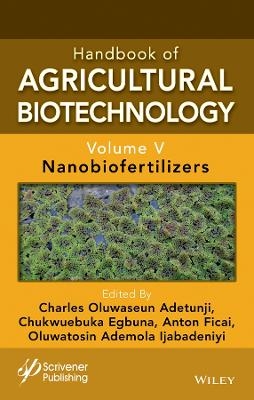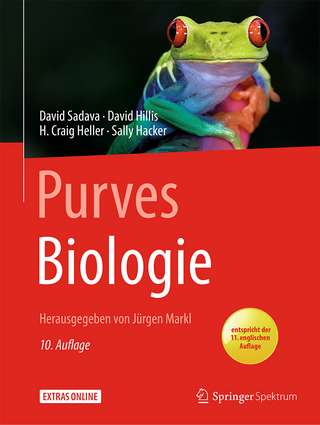
Handbook of Agricultural Biotechnology, Volume 5
Wiley-Scrivener (Verlag)
978-1-394-21149-4 (ISBN)
With the steady rise of the world’s population, there is a need to increase the production of safe and nutritious food. The constant loss of arable land, as a result of various anthropogenic activities from human action, has become a threat to global biodiversity and ecosystems. Additionally, the issue of climate change has imposed many obstacles to increasing agricultural productivity, especially from biotic and abiotic stressors and temperature-limited environments, such as in high altitudes or seasonally hot regions. Because of these factors, there is a need to adopt sustainable and modern technologies that can boost and improve the rate of food production.
One of the cheapest means of enhancing sustainable food production is to explore natural and unlimited beneficial microorganisms, particularly those that can increase the level of soil fertility, improve crop production and health, improve tolerance to stress, support nutrient uptake and availability, and boost natural biodiversity. The synergetic effect of nanotechnology and beneficial microorganisms for the effective bio-fabrication of nanobiofertilizers, is a sustainable solution for producing pesticide-free food. This book provides a deep insight into microbial diversity, recent techniques used for the isolation, screening, and characterization of beneficial microorganisms with eco-friendly attributes, used for bioengineering of nanobiofertilizers, as well as the application of proteomics, metabolomics, genomics, and bioinformatics. The book also covers commercialization, patents, and the business and socio-economic aspects of nanobiofertilizers, as well as the role of policymakers, stakeholders, and government agencies in the translation of nanobioferilizer research into policy.
Audience
The book is a useful resource for a diverse audience, including industrialists, food industry professionals, agriculturists, agricultural microbiologists, plant pathologists, botanists, microbiologists, biotechnologists, nanotechnologists, microbial biotechnologists, farmers, policymakers, and extension workers.
Charles Oluwaseun Adetunji, PhD, is a professor in the Department of Microbiology at the Edo University Iyamho, in Edo State, Nigeria. Currently, he is the Director of Intellectual Properties and Technology Transfer and Chairman of the Committee on Research Grants at EUI. He has won several scientific awards and grants from renowned academic bodies such as the Council of Scientific and Industrial Research (CSIR) India. He has published more than 600 papers in peer-reviewed national and international journals as well as more than 50 books, 340 book chapters, and many scientific patents. Chukwuebuka Egbuna, PhD, is a chartered chemist and academic researcher. He has been engaged in several roles at New Divine Favor Pharmaceutical Industry Limited, Nigeria as well as at Chukwuemeka Odumegwu Ojukwu University in Nigeria His primary research interests include biochemistry, phytochemistry, pharmacology, etc. He has published research articles in many international journals and edited over 20 books. Anton Ficai, PhD, is a professor in the Faculty of Chemical Engineering and Biotechnologies, University Politehnica, Bucharest, Romania. His research interests include tissue engineering, drug delivery systems, multifunctional materials, etc. He has published over 250 scientific papers, edited two books, received 10 patents, and has 18 patents in the application stage. Oluwatosin Ademola Ijabadeniyi, PhD, is the founder of Food Safety Africa and is a visiting professor at the Department of Food Science, University of Manitoba, Canada. He has worked in the food industry and academia since 2001 and has conducted research and lectured internationally about food quality and safety. His numerous scientific publications have earned several accolades, including research grants, awards, and fellowships such as the Association of Commonwealth Universities fellowship and the APHL-CDC fellowship.
Preface xxiii
1 Application of Nanobiofertilization for Bioremediation and Ecorestoration of Polluted Soil/Farmland 1
Oluwafemi Adebayo Oyewole, Konjerimam Ishaku Chimbekujwo, Margaret Oniha, Isibor Patrick Omoregie, Opeyemi Isaac Ayanda, Charles Oluwaseun Adetunji and John Tsado Mathew
1.1 Introduction 2
1.2 Nanoparticles 3
1.3 Nanobiofertilization in Bioremediation 10
1.4 Application of Nanobiofertilization in Bioremediation 15
1.5 Environmental Distress 21
1.6 Conclusion 22
References 22
2 Influence of Nanobiofertilizer on Plant Yield and Growth 37
Samuel Adeniyi Oyegbade, Andrew Aladele Kolawole, Jerry Gbotemi Oni, Alhassan Muhammad Alhassan, Oluwafemi Adebayo Oyewole, Margaret Oniha and Charles Oluwaseun Adetunji
2.1 Introduction 38
Nanobiofertilizer 39
Composition of Nanobiofertilizer 40
Mechanisms of Nutrient Delivery and Enhanced Bioavailability 42
Seed Priming (Nanopriming) 42
Soil-Based Application 43
Nanobiofertilizer Plant System Interaction 43
Impact of Nanobiofertilizer on Plant Biomass 44
Factors Contributing to Enhanced Plant Growth 45
Comparison of Biomass Enhancement with Traditional Fertilizers 47
Nanobiofertilizer-Induced Biomass and Chlorophyll Content Enhancement 49
Crop-Specific Responses to Nanobiofertilizers 49
Case Studies Highlighting Positive Outcomes on Various Crops 50
Environmental and Economic Considerations on the Use of Nanobiofertilizers 52
Comparison of Nanobiofertilizers with Traditional Fertilizers in Terms of Cost and Effectiveness 53
Potential Long-Term Benefits for Soil Health and Ecosystem 54
Addressing Concerns Related to Nanoparticle Toxicity and Accumulation 55
Need for Standardized Testing Protocols and Safety Assessments 56
Exploration of Innovative Nanobiofertilizer Formulations and Delivery Methods 57
Strategies for Incorporating Nanobiofertilizers into Existing Farming Systems 57
Synergistic Effects of Combining Nanobiofertilizers with Other Sustainable Practices 58
Practical Considerations for Large-Scale Implementation 58
Potential to Revolutionize Agriculture and Contribute to Food Security 59
Call to Action for Continued Research, Development, and Adoption of Nanobiofertilizers 60
Conclusion 60
References 61
3 Effect of Bionanofertilizer on Proximate Composition of Crops 71
Oluwadurotimi Samuel Aworunse, Fadekemi Akinhanmi, Ogochukwu Onwaeze, Alhassan Muhammad Alhassan, Oluwafemi Adebayo Oyewole, Charles Oluwaseun Adetunji and John Tsado Mathew
3.1 Introduction 72
3.2 Biological Synthesis of Nanofertilizers 73
3.3 Composition of Bionanofertilizers 79
3.4 Properties of Bionanofertilizers 82
3.5 Effect of Bionanofertilizers of Proximate Parameters of Crops 84
3.6 Conclusion and Future Direction 87
References 88
4 The Role of Policy Maker, Relevant Stakeholders and Government Agency in Translating Nanobiofertilizer Research into Policy 99
Alhasssan Muhammed Alhassan, Ruth Ebunoluwa Bodunrinde, Oluwafemi Adebayo Oyewole, Charles Oluwaseun Adetunji and John Tsado Mathew
4.1 Introduction 100
4.2 Views of the Dangers of Nanotechnology and Confidence in Stakeholders 101
4.3 Policy Making Process 102
4.4 Benefits of Agencies in the Nanoproduction of Fertilizer 102
4.5 Relevant Stakeholders in the Implementation of Policy 102
4.6 Report of Nanobiofertilizers Worldwide 103
4.7 Government Agencies and Their Impact 103
4.8 Translating Research into Policy 104
4.9 Global Safety and Legal Framework for Agricultural Goods Based on Nanotechnology 107
4.10 Future Initiatives and Studies to Support the Development of Nanobiofertilizers 108
Conclusion 111
References 112
5 Structural Elucidation, Detection, and Characterization of Essential Nutrients Necessary for Soil Fertilization 117
John Tsado Mathew, Abel Inobeme, Charles Oluwaseun Adetunji, Yakubu Azeh, Abdulfatai Aideye Otori, Elijah Yanda Shaba, Musah Monday, Musa Safiyanu Tanko, Ezekiel Tanko, Amos Mamman, Jibrin Noah Akoji and Oluwafemi Adebayo Oyewole
5.1 Introduction 118
5.2 Nitrogen (N) in Soil Fertilization 123
5.3 Phosphorus (P) in Soil Fertilization 127
5.4 Potassium (K) in Soil Fertilization 131
5.5 Optimization of Nutrient Management Strategies 135
Conclusion 139
References 140
6 Effect of Nanobiofertilizer on Phytochemicals 149
John Tsado Mathew, Abel Inobeme, Charles Oluwaseun Adetunji, Yakubu Azeh, Abdulfatai Aideye Otori, Musah Monday, Elijah Yanda Shaba, Badeggi Muhammad Umar, Amos Mamman, Jemkur Maurice and Oluwafemi Adebayo Oyewole
6.1 General Overview on Nanobiofertilizer 150
6.2 Constituents of Nanobiofertilizer 151
6.3 Importance of Phytochemicals in Plant Growth and Human Health 158
6.4 Mechanisms of Nanobiofertilizer on Phytochemicals 160
6.5 Recent Studies on Effect of Nanobiofertilizer on Phytochemicals 163
6.6 Conclusion and Future Trends on Nanobiofertilizer on Phytochemicals 167
References 168
7 Characterization of Nanoparticles Used as Nanobiofertilizers 175
John Tsado Mathew, Charles Oluwaseun Adetunji, Abel Inobeme, Yakubu Azeh, Musah Monday, Etsuyankpa Muhammad Bini, Abdulfatai Aideye Otori, Elijah Yanda Shaba, Muhammad Aishetu Ibrahim, Musa Safiyanu Tanko, Amos Mamman and Oluwafemi Adebayo Oyewole
7.1 Introduction 176
7.2 Some Spectroscopic Characterization Technique for Nanomaterials 180
7.3 Characterization of Nanobiofertilizer Through Chemical and Biological Synthesis 187
7.4 Application of Nanobiofertilizer 189
7.5 Environmental Impact Assessment 191
7.6 Future Perspectives and Challenges 192
7.7 Conclusion 194
References 194
8 Toxicological Effects of Nanobiofertilizer on Water Body, Water Quality, Lower Plants, Zooplanktons, and Beneficial Microorganisms 201
Ezugwu Basil Utazi, Oluwafemi Adebayo Oyewole, Japhet Gaius Yakubu, Tsado Priscilla Yetu, Isibor Patrick Omoregie, Charles Oluwaseun Adetunji, John Tsado Mathew, Victory Igiku, Eniola K. I. T. and Mohammed Bello Yerima
8.1 Introduction 202
8.2 Effects of Nanofertilizer on Soil Microbial Community 203
8.3 Nanofertilizers Versus Biofertilizers: Dissimilarity in Synthesis 205
8.4 Nanobiofertilizer 206
8.5 Conclusion 217
References 219
9 Various Techniques Used in the Application of Nanobiofertilizers on Crops After Synthesis 233
Victory Igiku, Charles Oluwaseun Adetunji, Oluwafemi Adebayo Oyewole, Fadekemi O. Akinhanmi, Simon Sunday Ameh, Eniola K. I. T. and Mohammed Bello Yerima
9.1 Introduction 234
9.2 Synthesis of Nanoparticles 235
9.3 Synthesis of Nanobiofertilizers 239
9.4 Methods Used in the Application of Nanobiofertilizers on Crops 240
9.5 Conclusion 244
References 244
10 Non-Target Effect, Environmental Impact, and Assessment of Nanobiofertilizer 253
Fadekemi O. Akinhanmi, Oluwadurotimi S. Aworunse, Oluwafemi Adebayo Oyewole, Charles Oluwaseun Adetunji, John Tsado Mathew, Victory Igiku, Eniola K. I. T. and Mohammed Bello Yerima
10.1 Introduction 254
10.2 Environmental Impact of Nanobiofertilizer on Soil Properties 256
10.3 Non-Targeted Effects on Soil Properties 257
10.4 Recommendation and Conclusion 264
References 266
11 Reported Genes Regulating the Biological Activities in Microorganisms Used in the Formation of Nanobiofertilizers 271
Victory Igiku, Charles Oluwaseun Adetunji, Oluwafemi Adebayo Oyewole, Eniola K. I. T. and Mohammed Bello Yerima
11.1 Introduction 272
11.2 Synthesis of Nanoparticles 273
11.3 Genes Regulating the Biological Activities in Plant Growth-Promoting Rhizobacteria 277
11.4 Conclusion 283
References 284
12 Relevance of Molecular Genetics and Synthetic Biology Involved in the Characterization of Microorganisms Used in Nanofertilizer Research 291
Simon Sunday Ameh, Daniel Gana, Mordecai Gana, Japheth Gaius Yakubu, Amarachi Rosemary Osi, Oluwafemi Adebayo Oyewole, Charles Oluwaseun Adetunji, John Tsado Mathew, Victory Igiku, Eniola K. I. T. and Mohammed Bello Yerima
12.1 Introduction 292
12.2 Molecular Genetics and Synthetic Biology 293
12.3 Nanotechnology 299
12.4 Constituents of Nanobiofertilizer 300
12.5 Formulation of Nanobiofertilizer 304
12.6 Microorganisms Employed in Nanobiofertilizer 304
12.7 Genetic Techniques Used to Study Microorganisms in Nanobiofertilizers 305
12.8 Conclusion 306
12.9 Recommendation 307
References 308
13 Techniques Used for Screening and Detection of Beneficial Microorganisms Used for Production of Nanobiofertilizers 315
Idris Abdullahi Dabban, Aisha Bisola Bello, Adioha Amarachi, Adejoh Suleiman Ocholi., Dewu Mansur Muhammad, Oko Joseph Odey, Oluwafemi Adebayo Oyewole, Charles Oluwaseun Adetunji, Eniola Kehinde Imisiagbaraolorun Temitope and Mohammed Bello Yerima
13.1 Introduction 316
13.2 Beneficial Microorganisms Used for Production of Nanobiofertilizers: Sources and Characteristic Traits 320
13.3 Techniques Used for Screening and Detection of Nanobiofertilizer-Producing Microbes 327
13.4 Molecular Techniques Used for Detection of Beneficial Microbes for Nanobiofertilizer Production 333
Future Perspectives 337
References 338
14 Toxicology and Adverse Effects of Chemical Fertilizer and Nanobiofertilizer Pollution of the Environment; Bioaccumulation, Greenhouse Effects, and Global Warming 347
Oluwafemi Adebayo Oyewole, Japhet Gaius Yakubu, Sani Rabiu Aishat, Iseghohi Frances, Tsado Priscilla Yetu, Opeyemi Isaac Ayanda, Charles Oluwaseun Adetunji, Eniola K. I. T. and Mohammed Bello Yerima
14.1 Introduction 348
14.2 Chemical Fertilizers 350
14.3 Environmental Pollution Caused by Use of Chemical and Nanofertilizers 357
14.4 Toxicological Effects of Fertilizers 359
14.5 Conclusion 370
14.6 Future Perspective 371
References 371
15 Effect of Climate Changes, Weather and Other Environmental Factors Whenever Nanobiofertilizer is Applied for Crop Improvement 377
Temitope Ayinde Oluwaseyi, Abah Daniel Okochegbe, Oluwafemi Adebayo Oyewole, Samuel Adeniyi Oyegbade, Enitan Emmanuella Lawal, Charles Oluwaseun Adetunji, Eniola K. I. T. and Mohammed Bello Yerima
15.1 Introduction 378
15.2 Nanobiofertilizers 380
15.3 Nanobiofertilizer: Pertinence to Trim Improvement 381
15.4 Nanobiofertilizer: Job in Crop Improvement 381
15.5 Nanobiofertilizer: Capability in Yield Well-Being 382
15.6 Progress Made with Nanobiofertilizers 382
15.7 Crop Improvement Outcomes Using Nanobiofertilizers 383
15.8 Environmental Factors and the Interaction of Nanobiofertilizers 383
15.9 Climate 386
15.10 Synergies and Challenges: Nanobiofertilizers in a Changing Climate 387
15.11 Weather Patterns and Nano Biofertilizer Performance 387
15.12 Strategies to Overcome Impact of Climate Changes 389
15.13 Conclusion 390
References 391
16 Effect of Nanobiofertilizer on Essential Amino Acid Constituents 395
Margaret Ikhiwili Oniha, Konjerimam Ishaku Chimbekujwo, Aisha Bisola Bello, Mordecai Gana, Oluwafemi Adebayo Oyewole, Charles Oluwaseun Adetunji, Kehinde Imisiagbaraolorun Temitope Eniola and Mohammed Bello Yerima
16.1 Introduction 396
16.2 Biofertilizers 397
16.3 Amino Acids 399
16.4 Nanofertilizers: Effect of Nanobiofertilizers on Amino Acids in Plant Growth 401
Conclusion 406
References 407
17 Relevance of Nanotechnology in Agriculture 413
Bello Oluwakemi Adetutu, Adamu Binta Buba, Fadekemi Akinhanmi, Mordecai Gana, Ezugwu Basil Utazi, Oluwafemi Adebayo Oyewole, Charles Oluwaseun Adetunji, Eniola K. I. T. and Mohammed Bello Yerima
17.1 Introduction 414
17.2 Nanotechnology’s Significance Across Industries 417
17.3 Nanotechnology in Agriculture 421
17.4 Nanotechnology in Crop Production 422
17.5 Nano-Based Crop Protection 435
17.6 Precision Farming and Sensors 440
17.7 Enhanced Nutrient Management: Utilizing Nanotechnology for Controlled Nutrient Release and Minimized Runoff 443
17.8 Challenges and Ethical Considerations in the Use of Nanomaterials in Agriculture 445
17.9 Future Directions and Research Opportunities in Nanotechnology for Agriculture 447
17.10 Conclusion 449
References 450
18 Recent Advancement Toward the Application of Proteomics, Metabolomics, Genomics and Bioinformatics for the Improvement of Nanofertilizer Research 463
Oluwafemi Adebayo Oyewole, Clement Shina Olusanya, Japhet Gaius Yakubu, Oluwadurotimi Samuel Aworunse, Ezugwu, Basil Utazi, Charles Oluwaseun Adetunji, Eniola K. I. T. and Mohammed Bello Yerima
18.1 Nanobiofertilizer 464
18.2 Constituents of Nanobiofertilizer 466
18.3 Nanobiofertilizer Preparation 476
18.4 Nanobiofertilizer and Soil Fertility 477
18.5 Response of Plant to Nanobiofertilizer 477
18.6 Setback and Impact of Nanofertilizer in the Framework of Sustainable Agriculture 478
18.7 Biotechnology Tools Used in Agriculture 480
18.8 Present Status of Nanobiofertilizer Research and Application 485
18.9 Application of Biotechnology Tools for Nanobiofertilizer Improvement 486
18.10 Conclusion 487
References 487
19 Isolation Techniques Used for Molecular Characterization of Beneficial Microorganisms: Cultural, Biochemical and Molecular Characterization 491
Idris Abdullahi Dabban, Muazu Ahmad, Sherifat Ozavize Enejiyon, Ahmad Nana Hauwau, Mustapha Gani, Oluwafemi Adebayo Oyewole and Charles Oluwaseun Adetunji
19.1 Introduction 492
19.2 Techniques for Isolation and Characterization of Bacteria and Actinomycetes: Cultural, Biochemical, and Molecular (16srRNA) 496
19.3 Techniques for Isolation and Characterization of Fungi 509
19.4 Methods for Isolation and Characterization of Algae 523
19.5 Conclusion and Future Perspective 530
References 531
20 Nanoparticle: Characterization and Their Potential Role as Revolutionary Nanobiofertilizer in Agriculture 547
Nisha Sogan, Smriti Kala and Alka Rani
20.1 Introduction 547
20.2 Silver Nanoparticle Characterization and Their Potential as Nanobiofertilizers 552
20.3 Potential of Gold Nanoparticles as Nanobiofertilizer and Their Characterization 554
20.4 Zn Oxide Nanoparticles as Nanobiofertilizer 554
20.5 Actinomycete-Based Nanobiofertilizers 555
20.6 Fungus-Based Nanobiofertilizers 555
20.7 Conclusion 556
References 557
Index 561
| Erscheinungsdatum | 02.10.2024 |
|---|---|
| Reihe/Serie | Handbook of Agricultural Bionanobiotechnology |
| Sprache | englisch |
| Themenwelt | Naturwissenschaften ► Biologie |
| Technik ► Umwelttechnik / Biotechnologie | |
| Weitere Fachgebiete ► Land- / Forstwirtschaft / Fischerei | |
| ISBN-10 | 1-394-21149-X / 139421149X |
| ISBN-13 | 978-1-394-21149-4 / 9781394211494 |
| Zustand | Neuware |
| Informationen gemäß Produktsicherheitsverordnung (GPSR) | |
| Haben Sie eine Frage zum Produkt? |
aus dem Bereich


